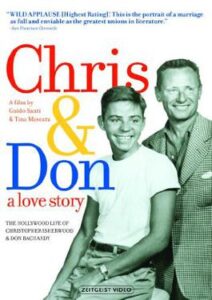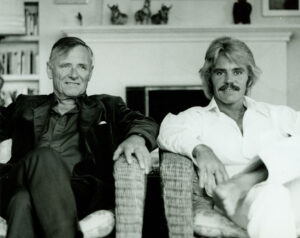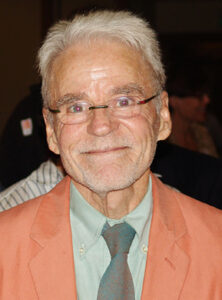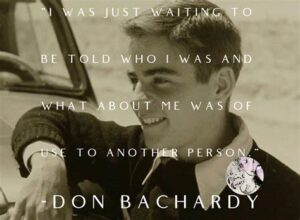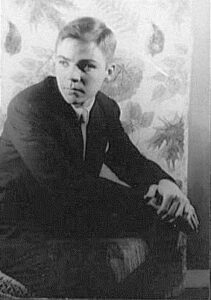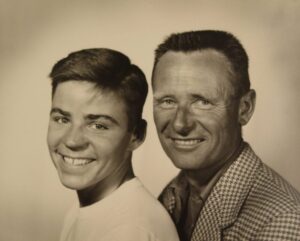Chris & Don: A Love Story *** (2007, Christopher Isherwood, Don Bachardy) – Classic Movie Review 12,617
Chris & Don: A Love Story is an insightful and poignant 2007 documentary film chronicling the lifelong relationship between author Christopher Isherwood and his younger lover, artist Don Bachardy.
Chris & Don: A Love Story is an insightful, fascinating and poignant 2007 documentary feature film chronicling the lifelong relationship between author Christopher Isherwood and his 30-year younger lover, artist Don Bachardy. The film combines present-day interviews, colour home footage shot by the couple from the 1950s, excerpts from Chris’s diaries, and playful animations to recount their romance.
In an obvious labour of love, Chris & Don is directed by Guido Santi and Tina Mascara, and was the centre piece film at NewFest, the New York LGBTQ Film Festival, in 2008.
Chris & Don: A Love Story is revealing and valuable, but it goes beyond the wistful into the depressing, and raises (and largely tackles) a lot of awkward issues. It’s not really the feel-good, nostalgic documentary film that the title suggests. It all depends on Don Bachardy’s on-screen testimony, and he is frank and brave, seeing things clearly. If Don Bachardy didn’t tell it, the story will be forgotten, consigned to the dustbin of history.
It’s so long ago. What does it matter? Bachardy suggests strongly why. It’s good to see Bachardy in such good shape in 2007, both physically and seemingly mentally, living what looks like the good life.
Also there’s a wonderful treasure trove wealth of home footage, art work, written work, memorabilia and archive material to illustrate the story. The playful animations mean well but are a bit of a mistake. So much seems left out. So much seems glossed over. Ah well.
Don Bachardy (born May 18, 1934) is filmed extensively in the Santa Monica home he shared with Isherwood, where he has lived for over 50 years and paints portraits. It may be a working home, and a lovely one, but it is also a shrine, or memorial to Isherwood, or even a museum.
He met Isherwood on Valentine’s Day 1953, when he was 18 and they remained together until Isherwood’s death in 1986. So, bumpy ride it may have been, especially with their open relationship in the Sixties, it is a true enduring love story.
Chris was a father figure, who in a sense moulded him, brought him out, introduced the star-struck Bachardy to the rich and famous, and helped him become a renowned portrait painter.
They lived their lives together bravely and openly in the repressive era of America in the Fifties as one of the first openly gay couples in Hollywood. Even living around artists and intellectuals, that took courage. Not everyone was impressed. Bachardy accuses Joseph Cotten of mounting a verbal homophobic attack on him. That’s hugely disappointing.
The film starts with a shock. Bachardy recalling the day Chris died, and instinctively going to read his diaries. A further shock is that Bachardy speaks just like Chris, in a transatlantic posh English accent, having unconsciously mimicked him back when they first met. He should speak like a Californian.
It ends with a shock too. Bachardy recalling his continuous portrait drawing of Chris as he was dying of cancer, sometimes to sick to sit for the portrait. Shockingly, he drew the lifeless Chris on his death bed in a final portrait. But, in extremis, whatever you need to do to get by is the right thing to do. It’s heartbreaking.
Bachardy’s older brother was still alive at the time of filming and he is seen going to meet him. Chris was originally attracted to the brother when they first encountered on the beaches of Santa Monica. The brother is manic depressive, treated then by electric shocks that changed his personality. He seems in a poor way, whereas Don cycles everywhere and goes to the gym.
Conclusion? Life is a ridiculous lottery, not so much a cabaret old chum. Don Bachardy pretty much won life’s lottery. By the way, Chris didn’t like Lisa Minnelli in Cabaret (miscast obviously because she could sing and dance brilliantly and her character couldn’t) but he did like Michael York, who narrates in the film. Liza Minnelli however appears in the film to say Chris loved the fame Cabaret brought him, and John Boorman and Leslie Caron also put in a word or two.
Don recalls the happy era of the Seventies, when Chris and Don were writing together and they wrote the screenplay of Frankenstein: The True Story (1973) together, the text of which he shows us proudly.
© Derek Winnert 2023 – Classic Movie Review 12,617
Check out more reviews on http://derekwinnert.com

